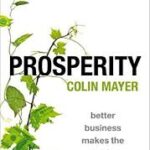
Prosperity
At least since the Great Recession in 2007 and 2008, many mainstream economists have begun questioning shareholder capitalism. First popularized by Milton Friedman in the 1960s, it holds that business has a single purpose–to make as much profit as possible for its owners (shareholders) as possible in the short run.
Among the best critics of shareholder capitalism is Colin Mayer who was the first professor and former dean of the Said School of Business at Oxford. In Prosperity, he makes the case that a) businesses have not always focused on short term profit maximization and b) that it is at best counterproductive in the world we live in today.
Instead, as those of us who believe in stakeholder capitalism suggest, a company is more than its owners and has duties to more than its owners. It is part of an ecosystem that includes its employees, suppliers, customers, and, in some cases, even its competitors. Of course, companies do have to pursue profit. But they have other goals as well–which Mayer calls their purposes.
In the early twenty-first century that means returning value to all of its component parts. That, in turn, means being accountable for all forms of capital a company uses, including its human, social, and natural resources as well as its financial ones.
The book is historical. However, it is the importance of his argument today that makes it relevant for peacebuilders and other in two main ways:
First, we have to shift our accounting methods so that we see all of the costs of our activities, especially those that affect what he calls our natural capital or the environment as we struggle to cope with climate change.
Second, companies have to define their purpose which normally involves more than “just” making money but usually involves seeking higher goals. That may involve doing “good” however one chooses to define that term. It may simply involve building products or providing services that help consumers solve vexing problems in the way that Word Press and Avada help me maintain my web site.
This is not an easy book. However, it is well worth it, especially for those of us who avoided conventional economics courses because they seemed to give such short shrift to the questions that mattered most to us.
